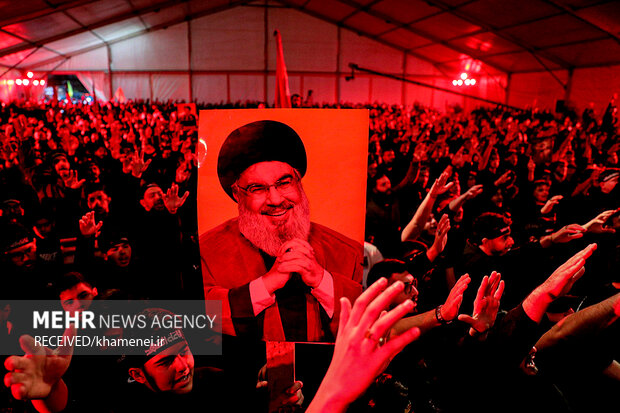How did Sayyed Hassan Nasrallah become Lebanon’s “national hero”?
In the last days of September 2024, when Israeli Prime Minister Benjamin Netanyahu traveled to New York to address the United Nations General Assembly, many mainstream media outlets reported the possibility of a ceasefire agreement on the northern front. While Lebanese leaders awaited positive news from Washington, senior officials of the Lebanese Islamic Resistance and the Revolutionary Guard Corps held a joint meeting at the group’s headquarters to review the latest situation on the battlefield.
Just minutes before the Likud Party leader was to begin his speech at the United Nations General Assembly, he contacted senior Israeli military officials and ordered the assassination of Sayyed Hassan Nasrallah and all the resistance commanders. In a terrorist attack, Israeli warplanes dropped hundreds of tons of explosives on the perimeter of Hezbollah’s headquarters in the heart of Beirut to ensure the martyrdom of Hezbollah’s Secretary General. Contrary to Zionist expectations, this incident did not end the Lebanese Islamic Resistance, but rather breathed new life into the resistance. In the rest of this note, we will try to examine the issue of how the leader of the Lebanese Islamic Resistance became a “national hero”?
From a beggar to the Secretary General of Hezbollah in Lebanon
Forty years ago, when Israeli tanks were marching through the streets of Beirut under the pretext of confronting the Palestine Liberation Organization, a group of Lebanese mujahideen from the Amal movement declared their existence, which later became known as the Lebanese Islamic Resistance.
Inspired by the school of the Islamic Revolution and the person of the Imam (may Allah have mercy on him), the Lebanese mujahideen believed in the idea of ”Wilayat al-Faqih” and called for armed resistance against the foreign occupiers. On October 23, 1983, the headquarters of the American occupiers in Beirut was attacked, killing 241 American marines and 58 French soldiers.
Precisely when American, French, and Israeli soldiers were marching through the streets of Beirut, the Lebanese mujahideen, empty-handed, paved the way for their gradual withdrawal until the beginning of the 21st century. These historical events are mentioned with the aim of not worrying about the future of the resistance, because Sayyed Hassan Nasrallah was able to transform a small guerrilla group into the largest political-military movement in Lebanon after the martyr Abbas Mousavi with his wise leadership. This shows that the “resistance discourse” is not only not weakened during war and crisis, but is also strengthened due to the spirit of “seeking martyrdom”.
A key figure in the process of state-nation building in Lebanon
In the process of completing the state-nation-building project in Lebanon, the person of the martyr Nasrallah played a key role. The most important manifestation of Sayyed Hassan Nasrallah’s nationalism and commitment to the security of Lebanon can be seen during the Battle of Al-Aqsa Storm. After the unexpected operation of the Izz al-Din al-Qassam Brigades against the Zionist regime, some members of the resistance axis demanded Hezbollah’s direct entry into the northern front. At the same time, the Macron government had offered Hezbollah’s Secretary General the presidency of the Lebanese parliament and $54 billion in aid in exchange for not entering the Palestinian front.
Sayyed Hassan Nasrallah, with a far-sighted vision and considering the political situation inside Lebanon, decided to choose a wise path. Today, in Lebanon, people from different political and intellectual groups and tendencies, regardless of daily competitions, are fascinated and interested in the discourse of resistance and the person of Martyr Nasrallah. According to field estimates made by journalists and experts based in Lebanon, many Christian citizens announced that they would participate in the ceremony today, Sunday, and pledge allegiance to their spiritual leader.
The late Secretary General of Hezbollah, as a national leader, saw the interests of all of Lebanon above any clan, religion, or political party. This led the Lebanese people to consider Martyr Nasrallah a national figure who prioritized the flag and national sovereignty of Lebanon above all individual and group desires and was ready to pay the price to protect the dignity and interests of Lebanon.
The School of Resistance, the Guarantee of Regional Security
In an era when the martyrs Nasrallah and Haniyeh are no longer present among the resistance, Benjamin Netanyahu and Trump found the audacity to call for the population of Gaza to be disrupted and the Palestinians to be transferred to Jordan and Egypt. When the Saudi Arabian monarchy, based on its traditional position, called for the implementation of the “two-state” idea based on King Abdullah’s plan, Netanyahu addressed the Saudi rulers in an interview with Israel’s Channel 13 and said in an insulting tone that if the Saudi rulers were truly concerned about the Palestinians, they would take them to the peninsula and pave the way for the formation of a Palestinian state.
Some analysts believe that the harsh language of the Israeli leaders towards the rulers of Arab countries will prove to the Islamic world that the existence of men like the martyr Nasrallah was a deterrent against Israel’s excesses and prevented Zionist excesses in the region. If Hezbollah in the heart of the Levant region cannot contain the heavily armed Israeli army, Arab countries must be prepared to redraw the borders of the region and implement the idea of a “Greater Middle East.” Accordingly, it is predicted that in the coming years, we must be prepared to support the countries of the region more than ever with the idea of resistance.

